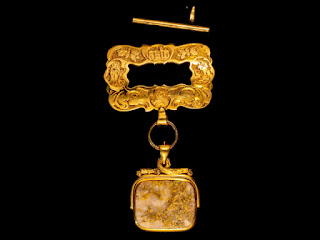Denver, CO, USA, August 11, 2022 -- After a century and a half on the ocean floor, nearly 1,000 historic California Gold Rush-era sunken treasure items from the 1857 sinking of the fabled “Ship of Gold,” the S.S. Central America, have been brought together again and many are in Colorado. These important artifacts, including exquisite jewelry made from California Gold Rush “mother lode” native gold in quartz as gemstones, will be publicly exhibited during the HardRock Summit 2022 gem and jewelry show (www.HardRockSummit.com), September 8 through 11, at the Colorado Convention Center, 700 14th Street in downtown Denver.
“More than 60 gold and gemstone rings, gold nugget stick pins and gold quartz cuff links were recovered and all of these Gold Rush-era creations will be displayed for the first time in Denver,” said Fred Holabird, president Holabird Western Americana Collections, LLC (www.HolabirdAmericana.com) Reno, Nevada.
One of the important recovered items is a large 18-karat gold quartz engraved brooch that prominent San Francisco businessman Samuel Brannan was sending to his son in Geneva, Switzerland, as a gift to the son's teacher. There is also a recovered REGARD ring created with a ruby (missing), emerald, garnet, amethyst, rose quartz, and diamond.
The recovered artifacts will be offered in public auctions in October and November by Holabird Western Americana Collections of Reno, Nevada.
The S.S. Central America sank 7,200 feet deep in the Atlantic Ocean off the North Carolina coast during a hurricane on September 12, 1857. She was on a voyage from Panama to New York carrying tons of California Gold Rush coins, ingots, and gold dust from the San Francisco and Northern California area. The tragedy took the lives of 425 of the ship’s 578 passengers and crewmembers, and the loss of the gold cargo was a major factor in the economically devastating financial Panic of 1857 in the United States.
Recovery from the shipwreck site of what has been described as “America’s greatest treasure” occurred in several stages between 1988-1991 and again in 2014. Thousands of retrieved gold coins and hundreds of gold bars have been sold since 2000; however, these latest items were kept in storage in three different states, Maryland, Massachusetts, and Ohio, until a court-approved settlement was reached ending a decades-long ownership dispute.
Among other notable, recovered items that will be exhibited in Denver are the lid to the oldest known Wells Fargo treasure shipment box; 1857 clothing including a pair of the earliest known Gold Rush-era canvas work pants jeans with a button fly that may have been made by Levi Strauss in his early years in business; photographs; and for its first display anywhere, a porthole from what is believed to be Captain William Lewis Herdon’s topside cabin.
“There is even a key to the ship’s wine storage room and an S.S. Central America brass name tag attached to a set of keys that belonged to the ship’s purser. We believe these were for the locked room where the gold treasure cargo was kept,” Holabird explained. “These historic items are a time capsule from the California Gold Rush.
“These incredible artifacts are now giving us a glimpse of Gold Rush-era daily life for passengers and crew in the 1850s,” said Dwight Manley, Managing Partner of the California Gold Marketing Group of Brea, California, which owns the recovered items.
Some 19th-century photographs were also recovered. One daguerreotype metal plate photograph of an unidentified young woman was nicknamed, “Mona Lisa of the Deep,” by the scientific mission recovery team that retrieved the mysterious photo from the seabed where it was discovered in a scattered pile of the ship’s coal.
“Other items recovered include pistols; brass luggage tags; passengers’ ticket receipts; galley utensils and dishes; bottles and ornate, flint glass wine and spirits decanters that appear to have been a standard amenity in the first-class staterooms; eyeglasses in solid gold frames; and even chewing tobacco in a pouch apparently from the 1851 London World’s Fair,” Holabird revealed.
“Seemingly ordinary items from the passengers and crew today give us extraordinary insight into the everyday lives of the people who traveled on the steamship,” said scientist Bob Evans who was on each of the recovery missions and will be at the exhibit in Denver to talk to visitors about the “Ship of Gold” and the recovered Gold Rush artifacts.
For additional information about the recovered artifacts and auctions planned for October and November, visit www.HolabirdAmericana.com, call 775-851-1859, or email info@holabirdamericana.com.
About Holabird Western Americana Collections, LLC:
Holabird Western Americana Collections, LLC is always seeking new and major collections to bring to market. It prides itself as being a major source for selling Americana at the best prices obtainable, having sold more than any other similar company in the past decade alone. The firm will have its entire sales database online soon, at no cost – nearly 200,000 lots sold since 2014. Anyone owning a collection that might fit into an upcoming Holabird Western Americana Collections auction is encouraged to get in touch. The firm travels extensively throughout the United States and has agents all over the country who will travel to inspect most collections. To consign a single piece or a collection, you may call Fred Holabird at 775-851-1859 or 844-492-2766; or, you can send an e-mail to fredholabird@gmail.com. To learn more about Holabird Western Americana Collections, LLC visit https://www.holabirdamericana.com











